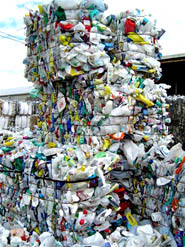Jane Chastain

Do you recycle? Do you meticulously separate your cans, bottles and plastic containers from the paper and cardboard?
The world is going green, but when it comes to our garbage, what we have been conditioned to do or feel compelled to do or – worse still – are coerced to do may end up hurting, not helping, the environment. There is nothing inherently wrong with recycling. It’s been going on since the beginning of time and is as old as, well, garbage itself.
In urban areas, there must be an orderly and sanitary way to dispose of trash. Only in the last 25 years, however, have state and federal regulators gotten involved in the methods used in trash disposal.
Presently, the nation is preoccupied with recycling. Much of it is counterproductive and based on misinformation. Thanks to Daniel K. Benjamin, a professor of economics at Clemson University, and PERC, the Property and Environmental Research Center, for a study that examined the “Eight Great Myths of Recycling.” They are as follows:
- Our Garbage will bury us.
- Our garbage will poison us.
- Packaging is the problem.
- We must achieve trash independence.
- We squander irreplaceable resources when we don’t recycle.
- Recycling always protects the environment.
- Recycling saves resources.
- Without forced recycling mandates, there wouldn’t be recycling.
There is no garbage crisis: never has been; never will be – especially if the free market is allowed to handle the process. Government has a role to play in regulating where our landfills can be located and making sure that they are safe for the environment. However, when it comes to dictating what we can dispose of and what we must recycle, this is going way too far.
There is great truth to the saying, “One person’s trash is another person’s treasure.” Throughout the world, it is the poor who benefit most from the scavenging process. Likewise, here in the U.S., it is the less affluent, less densely populated areas that benefit most from the business of garbage disposal. According to the Benjamin study, this trade in trash is driven by widely varying disposal costs and inexpensive transportation. The garbage trade raises our wealth as a nation by at least $4 billion. There is no shortage of landfills and the modern landfill is not dangerous. In fact, it is often more expensive and more costly to the environment to recycle than to send those products to a landfill.
Recycling is a manufacturing process and it has an environment impact. The U.S. Office of Technology Assessment says it is “usually not clear whether secondary manufacturing produces less pollution per ton of material processed than primary manufacturing processes.”
Let’s look at paper. The Environmental Protection Agency found that there were only five toxic substances found in the virgin paper process, while there are eight in the recycling process. The EPA found there are twelve toxic substances common with both processes but, among the twelve, all but one was more prevalent in the recycling process.
To be sure, recycling-based secondary manufacturing generally uses less energy and consumes less raw materials. However, all raw material and energy savings evaporated when PERC compared the true costs of recycling versus other forms of disposal.
In communities where curbside recycling is mandated, it requires more trucks to collect the same amount of waste. This requires more iron and coal mining, more steel and rubber manufacturing and more petroleum, which produces more air pollution. All the associated costs are passed along to consumers and taxpayers. Yes, many states and local communities subsidize their recycling programs and hide the true costs in an attempt to prove these programs are cost-effective.
It is not surprising to discover that all the profitable opportunities for recycling have been provided by the private sector. This type of recycling dwarfs all government recycling programs. Informed, voluntary recycling conserves resources and raises our wealth. However, things like bottle and can deposit laws – which artificially raise the value of these items to 5 or 10 cents, when in actuality they are worth only a penny or less – induces many to engage in a wasteful activity which consumes valuable time and resources which could be put to better use.
Bottom line: Market prices will, in fact, cause companies and individuals to recycle their own and other people’s trash. This, in turn, provides the greater benefit to the environment and all concerned.


